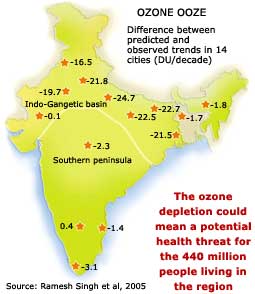Climate Change
Collection of articles on climate change with special reference to India
Posted on 20 Aug, 2009 12:36 PMClimage Change, Indias perceptions, positions, policies and possibilities, written by Jyoti K Parikh and Kirit Parikh, Indira Gandhi
Teaching climate change: An interactive toolkit that will help communicate related ideas better
Posted on 20 Aug, 2009 11:50 AMIt offers modules on various aspects of climate change in an interactive student friendly manner designed to making teaching fun for you.
Download the toolkit here - WWF Nepal
Government of India's National Environment Awareness Campaign: Entry forms
Posted on 19 Aug, 2009 10:03 PMThe Indian Government conducts a National Environment Awareness Campaign every year.
International Climate Champions: A British Council and TERI initiative
Posted on 19 Aug, 2009 09:18 PMBritish Council and TERI have identified 52 youth over the country who are empowered to pilot climate change adaptation and mitigation activities in their communities as part of their International Climate Championships 2009 program.
Campaigns aimed at battling climate change being organized in Karnataka
Posted on 19 Aug, 2009 09:09 PMYou too can play an active role in these activities. Use the contacts provided in this newsreport to be an active member of the global climate change crusade.
Fighting climate change: Greenpeace
Posted on 19 Aug, 2009 08:55 PMGreenpeace has done a lot of commendable work in the field of climate change. This link takes you through their climate change campaigns involving the masses.
District level vulnerability to climate change: An IPCC assessment
Posted on 19 Aug, 2009 03:26 PMOn a scale of 5, from lowest to highest, this map shows the vulnerability of various districts of the country to climate change. The map shows many of these regions are doubly exposed to the risk of climate change.
Invitation: 3rd world climate conference (WCC-3 2009),31 Aug 2009, London
Posted on 02 Aug, 2009 08:27 PMImage and Content Courtesy: United Nations 
On behalf of the Organizing and Scientific Committee,the United Nations is pleased to invite you to participate at the 3rd World Climate Conference (WCC-3 2009). The conference is scheduled from 31 August - 4 September 2009 at the International Conference Center London, United Kingdom. Conference Theme is: "Climate prediction and information for decision-making: focusing on scientific advances in seasonal to interannual timescales, taking into account multi-decadal prediction". The WCC-3 2009 steering Committee welcomes Scientists, climate service providers, High-level policy-makers, Global business leaders,Decision-makers from the public and private sectors, Green visionaries, Academia, IO's and NGO's, Professionals in relevant fields, Women and Youth Organizations, Development Groups, Governmental Agencies, Civil Society Organizations, Community Development Organizations, Donor Agencies and Individuals working in the related field to participate and submit papers and proposals for presentation at the interactive sessions and workshops. Papers should broadly explore the conference theme. The presentations may be completed research, research in-progress or case studies, especially those reflecting innovative Green building practice. Generally the presentations will consist of a panel of three or four presenters with similar topics. Each presenter will speak for ten minutes and after all presentations are completed the floor will be opened for questions and discussions.
The economics of climate change in Southeast Asia: a regional review
Posted on 13 Jul, 2009 09:53 AMClimate change will affect everyone but developing countries will be hit hardest, soonest and have the least capacity to respond. South East Asia is particularly vulnerable to the impacts of climate change with its extensive, heavily populated coastlines, large agricultural sectors and large sections of the population living under $2 or even $1 a day.






